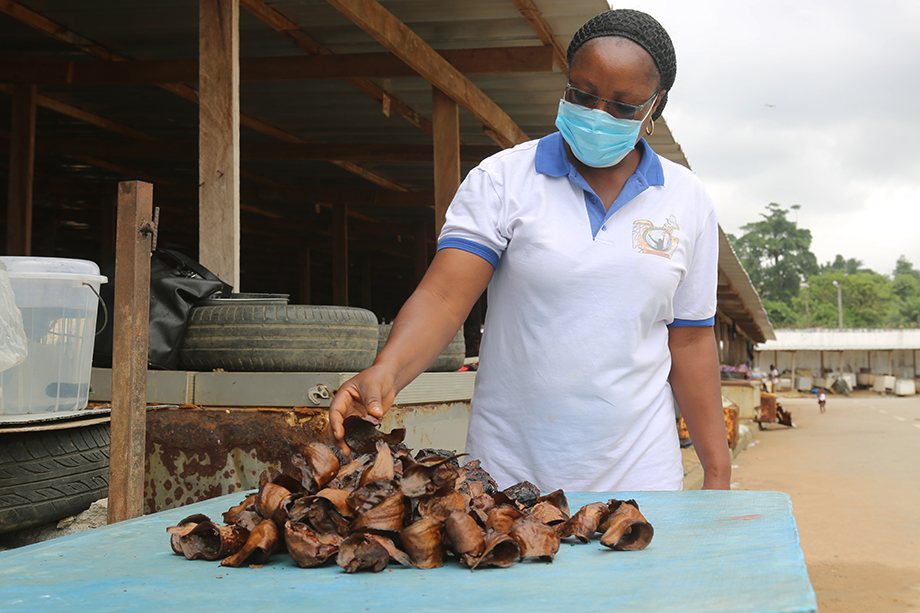The role of small-scale fisheries in Côte d'Ivoire
Empowering women fish processors in coastal communities transforms trade
06/05/2021

6 May, Abidjan – Members of Côte d'Ivoire’s national technical committee have been reviewing the Coastal Fisheries Initiatives’ (CFI) progress in securing social inclusion across West African nations over a tumultuous 12-month period dominated by the COVID-19 pandemic.
The West African nation boasts 550 kilometres of coastline – offering ample scope to provide jobs to contribute to poverty alleviation.
The fisheries sector employs more than 400 000 people in the country yet raising awareness of the standards that need to be met to fulfil producers’ economic potential remains a challenge.
The CFI aims to expand access to practices that ensure environmental, social, and economic sustainability through good governance and innovation in artisanal fisheries in three West African countries: Côte d'Ivoire, Senegal, and Cabo Verde.
“Improving the governance of fisheries and aquaculture and the quality of fishery resources cannot be achieved without establishing functional co-management committees. It is our duty to contribute to the sustainable management of resources by expanding the training and supervision of individuals whose livelihoods depend on their catch,” said National Professional Officer (NPO) at FAO Aboubakar Koné.
"It is our duty to contribute to the sustainable management of fishery resources by building the capacities of fishing communities whose livelihoods depend on their exploitation," he said.
 @FAO/Mireille Boti |
Granting women greater gender parity to advance food security
Women play a central role in the post-harvest sub-sector in Côte d'Ivoire. The CFI works with at least 12 professional artisanal fishing organizations; spread over the two pilot sites of the project, Locodjro, in the commune of Attécoubé, a suburb of the capital Abidjan and Sassandra, a town in the south of the country. They have approximately 1 436 members, but although 75 percent are female, they are often left out of the decision-making process.
The Initiative is training them up to gain basic accounting skills to run small businesses, in organizational planning and management, good hygiene practices and sanitary standards to access remunerative markets and boost their incomes.
The CFI in West Africa is also introducing women to international systems such as the Ecosystem Approach to Fisheries management (EAF), the Voluntary Guidelines for Securing Sustainable Small-Scale Fisheries (SSF Guidelines) so that they can enjoy greater autonomy.
“By setting up an association led by women for women, we are overcoming structural barriers and building opportunities for women in fisheries to prosper,” explained the President of “SCOOPS MATRAPHAS” Traoré Bintou – a cooperative group for female fishers and processors in Sassandra.
The CFI is scaling-up the many advantages of cooperatives in Côte d'Ivoire to create healthier working conditions for the countless women who spend most of their days in smoke-filled environments that have a detrimental impact on their health.
Over the past year, the global pandemic and the ensuing economic crisis have reversed developmental progress and revealed long-standing systemic inequalities and exclusion.
The Director of Aquaculture and Fisheries in Côte d'Ivoire Shep Helguilé called for: "Greater synergies in the artisanal coastal fishing sector to create better environments conducive to private investments and correct incentives for the adoption of good practices in capture and post-capture operations.”
“If we reach this target, individuals across the artisanal fishing value chain in coastal ecosystem communities will take up the challenge of more egalitarian, inclusive and sustainable fishing today and tomorrow," he added.
The CFI is a global collaborative effort funded by the Global Environment Facility (GEF), bringing together United Nations agencies and international conservation organizations at the forefront of efforts to strengthen fisheries management and conserve the marine biodiversity in coastal areas through better governance and strengthening of the seafood value chain.
